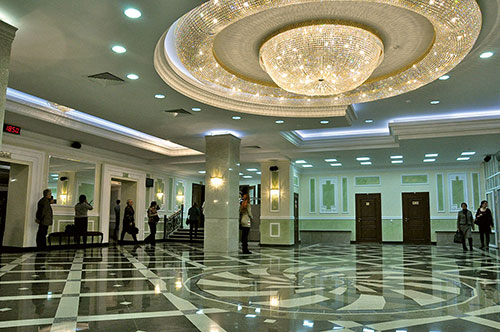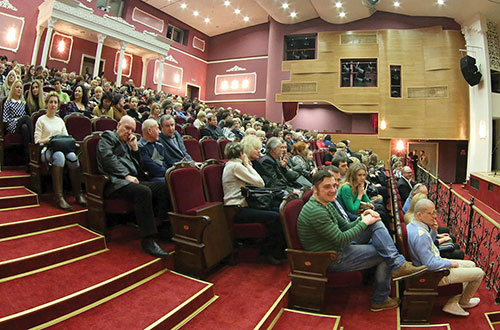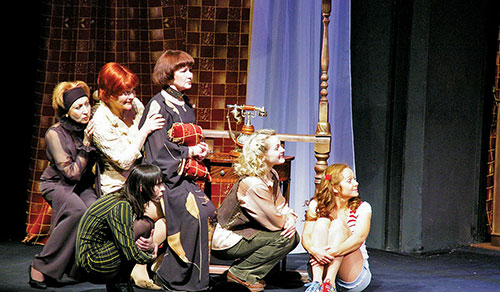


At the Young Spectator’s Theatre it is beautiful, cosy and comfortable now
The double holiday at the Young Spectator’s Theatre turned out well, with the Company clearly delighted at moving into their own building at last, with its cosy make-up rooms, convenient stage, and hall with excellent acoustics! Only those who have experienced endless upheaval can truly appreciate such joy. A mood of elation reigned.
The company began under director Grigory Borovik, based at the Belarusian State Philharmonic Society. Its actors rehearsed in clubs, palaces of culture, and in the former Spartak cinema, as well as on the stage of the Palace of Culture of Builders (now, the Young Spectator’s Theatre). However, all past inconvenience can now be put firmly behind them, as they embrace the wonderful aesthetics of the new building: sparkling chandeliers, and a tasteful interior, whose foyer is hung with stylish portraits of actor.
Their humorous skit was the result of the actor’s own invention, without a director’s interference, and did raise many smiles. It rather reminded me of their light-hearted January performance of Russian Style Cabbage, staged at the National Academic Drama Theatre of Maxim Gorky. During the interval, I heard senior generation actors praising their young colleagues, who had written the performance.
The skit accentuated the good and bad of theatre life, showing not only past troubles but the subtleties of the acting trade. One scene featured a trio of ‘elders’ singing of how they are yet a match for the younger generation: Yelena Khristich, Natalia Podvitskaya and Anna Laukhina were on excellent form.
Boris Lutsenko, the Director of the Maxim Gorky National Academic Drama Theatre, commented on the mission of the Young Spectator’s Theatre, saying that it aims to ‘embody the vitality and immortality of the human spirit, in its eternal enthusiasm, ever searching for new forms’.

Yelena Khristich
Yelena Khristich has great experience of working with children, having served with Minsk’s Young Spectator’s Theatre for ten years. Only talented actors can win and keep the attention of children and teenagers and her colleagues admit that Yelena certainly manages to do so. Sergey Zhuravel, a People’s Artiste of Belarus, worked with her for some time, recollecting, “Yelena acted the parts of schoolgirls so naturally that teenagers would sit with bated breath in the hall, watching her games.” Grigory Borovik invited Zhuravel and Khristich, among others, to Minsk’s Young Spectator’s Theatre to ‘revive’ it. Yelena is among just five ‘old timers’ who were there from the early days.
Some have since moved to other theatres or left Belarus, while some have retired. Valeria Likhodey moved to Moscow, and Vasily Nikitenko to St. Petersburg. Igor Filchenkov and Marina Dudareva now work for the Belarusian Army Drama Theatre, while Vladimir Mishchanchuk has moved to the Theatre-Studio of Film Actors. Meanwhile, Sergey Zhuravel recently took up employment at the Yanka Kupala National Academic Theatre.
Yelena remembers fondly how the theatre came into her life during her childhood, saying, “I dreamt of becoming a ballerina but my parents advised me against entering choreographic college, leaving the family home in Baranovichi. Minsk had no boarding school for students from other cities. My desire to appear on stage only grew over time however. Like many girls, I was fond of dancing and sports and began taking part in performances by the Baranovichi People”s Theatre.”
It was there that she realised that she couldn’t live without the theatre. As soon as she finished school, she applied to study acting at the Belarusian State Theatre and Art Institute (now the Academy of Arts). Aged just 16, she failed to gain a place, as Vladimir Malankin said that she was too young and naïve, advising her to apply again the following year. Lena then fell into the hands of other master, Alexander Butakov, whose students were among the youngest, with most having only just finished school. She explains, “After five years of study, my friend Galina Kukhalskaya, and I, alongside Kupala Theatre actor Alexander Podobed, graduated from the Institute. Tamara Levchuk moved to Brest, while Vladislav Karaka and Alexey Bychkov went to Gomel.” Some of her fellow students died young; everyone had their own destiny.

Scene from ‘Bankrupt’ performance
After graduating, the young actress was sent to work at the Drama Theatre named after Wincenty Dunin-Marcinkiewicz, located in Bobruisk. The company toured across the whole former Soviet Union, allowing Lena to gain impressions and experience. Grigory Borovik, the chief director of the Young Spectator’s Theatre, then offered her a permanent position and her Minsk acting life began.
Yelena, your life has been connected with that of dramatic theatre. Do you regret having left behind ballet?
Certainly not, because who knows what my choreographic destiny would have been? Probably, I would have danced in the corps de ballet. Meanwhile, now I have a quite successful career, having performed many interesting roles.
You worked with the Young Spectator’s Theatre for a long time. What are your first memories?
I recollect the children, whose faces reveal so much; you can tell how sincerely you are acting by looking at their expressions. Children always see falseness, yet are also naive. They can believe in fairy tales, and dream. They are complex creatures.
Do you have any particular acting or psychological methods to keep the attention of children?
There are no such methods; you just need talent, charm and charisma. People’s Artiste of Belarus Mikhail Petrov could hold the attention of an audience, bewitching them all! He was always amazing! What a Karlsson he was! We used to crowd backstage and roar with laughter. Mikhail was a real virtuoso.
Why did you move to the Young Spectator’s Theatre?
I grew out of children’s roles and wanted to test myself elsewhere. Besides, I was invited to join by the chief director. Seven of us moved there and launched everything from scratch. I remember our feelings of delight and enthusiasm. We were united in spirit.
For a long time, we lacked our own hall, performing on various stages and rehearsing at clubs, often at night: even at the Belarusian State Musical Theatre. It was ten years before we were given the former Spartak cinema building. We had used the Palace of Culture of Trade Workers but it wasn’t designed to be a theatre, requiring us to reconstruct it with our own labour. We then ‘wandered’ for five more years, until our very own building was finally completed and we celebrated our jubilee.
Did this ‘wandering’ place a strain on the troupe?
No, we never had conflicts, as we all understood the reality of our situation and the need to accept it. Those who didn’t simply left.
Yelena is now the ‘old timer’ of the Young Spectator’s Theatre. I last saw her perform in Eight Women, by Robert Thomas, playing the Grandmother of the family in which no men are born. The plot revolved around Marcel: the host of the house, her son-in-law. Under his roof, all are women: his wife, their daughters, the sister, and the housekeeper. An ‘ironic detective story’, Marcel feigns death on the advice of his youngest daughter, to discover how each family member really feels about him. On discovering the truth, he shoots himself!


Scene from ‘Eight Women’ performance
I attended the show with memories of François Ozon’s musical comedy version of Eight Women, starring Hollywood’s Catherine Deneuve as Marcel’s wife Gaby, and Fanny Ardant as his sister. The stage performance surpassed all my expectations, being dynamic, harmonious and touching. The actors internalised their characters, showing true understanding of their roles, so it was a pleasure to watch them, and empathise. Yelena was perfect as the Grandmother, urging her daughters not to quarrel. We realise that she and Marcel’s youngest daughter wish to stay in the house at any cost, being unwilling or unable to support themselves. Their internal anxiety comes across clearly.
How does this skilled actress, who was awarded the Frantsisk Skorina medal for creative achievements, feel about working alongside young actors? Does she like the new hall, or feel nostalgic for former times? We chat in Yelena’s personal make-up room.
I do feel nostalgic for the past at times, as that was my youth. I enjoy the company of young actors; I take something from them, and I hope that I also give them something. I like the hall very much: it is neither too big, nor too small, and its amphitheatre design has good acoustics. Rows of seats are staggered downwards, so no views are impeded.
What do you feel about today’s young actors?
Various people come to us: some are very talented and all comes easily to them, while others gain success through persistence. I can’t help but perceive them as ‘another generation’; they hail from the same acting school but speak and behave differently on stage. This doesn’t prevent me from understanding them, and I hope that they understand me too. If they ask me for advice, I give it, but I don’t offer without being asked, as it’s easy to cause offence. I’ve been young too, so I understand the feelings of the young.
I’ve heard of the superstition that a stage sometimes ‘takes against’ an actor, causing them to stumble, or forget words. What do you think?
Thank God, I’ve never experienced such oddities. I feel comfortable here; perhaps, the stage remembers the first ‘heroes’.
I remember reports of the actors of Master and Margarita experiencing unexplained difficulties while filming. Do you feel wary of spending so much time in a wheelchair: as if life might then emulate art?
In honesty, the thought had never occurred to me. The wheelchair is nothing more than a prop. Just like any person, actors can experience failure. I’m not superstitious or afraid of anything. If I was, it could lead to paranoia. Everything is ultimately in God’s hands.
An actor’s professionalism must reveal itself if you can rise above such talk. Would you say that’s so? Is there a pinnacle you can reach?
Only a fool would say such a thing, as it’s impossible to ‘reach the top’. Finishing acting school means nothing; having a diploma does not make you an expert. Experience gained through performance is vital in bringing professionalism. If you have this experience and cease striving to improve your skills, you are in danger of losing them!
Women are encouraged to retain their youth. Do you think actresses are the same?
Actresses cannot show their age, and must always be on good form. It’s better for them to leave the theatre if not; the stage does not stand for careless work.
Which roles would you like to perform and, which performances do you like most of all?
Actors tend to be very dependent, having to perform roles bestowed upon them. However, any role can be interesting. It actually becomes more satisfying if you find the role challenging, since it requires greater effort for you to master the character. Of past performances I like ‘A Simple Story’ by Goncharov, and ‘If I Had Golden Mountains’ by M. Lado. Both were staged by talented people, with the works displaying depth and philosophical sense. Audiences were able to reflect on something important, leaving the theatre without feeling deceived or dissatisfied, as sometimes happens with modern interpretations: a beautiful wrapper, with nothing inside.
How do you feel about constantly submitting to the director?
I understand the hierarchy of ‘director-actor’, with the director dominating. It’s the norm, although our Theatre lacks a chief director at present.
What can you say about your repertoire?
We have full houses, and no ‘shallow’ performances.
Will the art of theatre endure?
While we remain alive, we’ll always seek out theatre performance. We already have TV, the Internet and 3D cinema but we seek out ‘live’ performance as it’s more real. If you are having a bad time, depressed by the weather or your job, with problems, as we all have, you can escape to the theatre, feeling the breath of actors. It’s nothing like the cinema, although a story can be identical.
Of course, not all actors can play every role, no matter how hard they persevere. Think of Innokentiy Smoktunovsky [a famous Russian actor] in Chekhov’s ‘Ivanov’. I saw it in Moscow. Do you know what Smoktunovsky did? He hit his hand on the table so hard that you’d think he’d broken the bones. Afterwards, his acting was transformed for the better.
What do you do when you cannot act a part?
If you are performing, you cannot assume bad moods. Regardless of personal preference, you have a job to do. I’m performing in ‘Bankrupt’ and, every morning, must prepare myself for the role. I cannot stand on stage with a cold heart, without responding properly to my fellow actors, as the audience would never forgive such a thing.
Do you feel that audiences respond to your acting?
It is easier to assume a role if you feel the audience behind you. I think only actors will understand what I mean.
The Theatre is 30 years old: is this young or old?
I think it is the beginning of maturity. The Yanka Kupala National Academic Theatre is 75 years old and some others have been going 90 years. Ours is middle-aged.
Does a theatre’s repertoire reveal its age?
I doubt that. We’re currently staging timeless classics, such as Chekhov’s ‘Seagull’, and Ostrovsky’s ‘Bankrupt’ and ‘The Dowerless Girl’.
What advice would you give to future stars of the stage?
I choose to give none, since wise people do not give advice. I wish them only good luck!
By Alisa Krasovskaya











